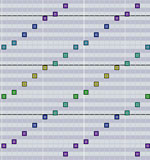Shepard tone
The Shepard tone, named after cognitive scientist Roger Shepard, is a compelling auditory illusion that creates the effect of a tone that seems to ascend or descend in pitch endlessly, without ever actually changing its overall pitch range. This phenomenon is achieved through the superposition of several tones separated by an octave, played in a continuous sequence. As the sequence progresses, tones at the upper end of the scale fade out, while those at the lower end fade in, creating a seamless loop that can theoretically continue indefinitely. The Shepard tone is not only a fascinating subject in the field of psychoacoustics, but it has also found applications in various fields such as music and sound design. Composers like Jean-Claude Risset and artists such as Pink Floyd have incorporated Shepard tones into their work, exploiting its unique properties to create musical pieces and sound effects that appear to perpetually rise or fall in pitch. In addition to its musical applications, the Shepard tone has been utilized in psychological studies to explore human perception of sound, and how auditory illusions can affect our understanding of pitch and scale. It serves as a powerful tool for researchers in the field of cognitive science, offering insights into how the brain processes complex auditory stimuli. The creation and manipulation of Shepard tones involve sophisticated audio processing techniques. By carefully controlling the volume, pitch, and timing of each component tone, it is possible to craft sounds that defy traditional auditory expectations. This has made the Shepard tone a subject of interest not only among researchers and musicians but also among sound engineers and enthusiasts who are keen to explore the boundaries of auditory perception.
Search WikiMD
Ad.Tired of being Overweight? Try W8MD's physician weight loss program.
Semaglutide (Ozempic / Wegovy and Tirzepatide (Mounjaro / Zepbound) available.
Advertise on WikiMD
|
WikiMD's Wellness Encyclopedia |
| Let Food Be Thy Medicine Medicine Thy Food - Hippocrates |
Translate this page: - East Asian
中文,
日本,
한국어,
South Asian
हिन्दी,
தமிழ்,
తెలుగు,
Urdu,
ಕನ್ನಡ,
Southeast Asian
Indonesian,
Vietnamese,
Thai,
မြန်မာဘာသာ,
বাংলা
European
español,
Deutsch,
français,
Greek,
português do Brasil,
polski,
română,
русский,
Nederlands,
norsk,
svenska,
suomi,
Italian
Middle Eastern & African
عربى,
Turkish,
Persian,
Hebrew,
Afrikaans,
isiZulu,
Kiswahili,
Other
Bulgarian,
Hungarian,
Czech,
Swedish,
മലയാളം,
मराठी,
ਪੰਜਾਬੀ,
ગુજરાતી,
Portuguese,
Ukrainian
Medical Disclaimer: WikiMD is not a substitute for professional medical advice. The information on WikiMD is provided as an information resource only, may be incorrect, outdated or misleading, and is not to be used or relied on for any diagnostic or treatment purposes. Please consult your health care provider before making any healthcare decisions or for guidance about a specific medical condition. WikiMD expressly disclaims responsibility, and shall have no liability, for any damages, loss, injury, or liability whatsoever suffered as a result of your reliance on the information contained in this site. By visiting this site you agree to the foregoing terms and conditions, which may from time to time be changed or supplemented by WikiMD. If you do not agree to the foregoing terms and conditions, you should not enter or use this site. See full disclaimer.
Credits:Most images are courtesy of Wikimedia commons, and templates, categories Wikipedia, licensed under CC BY SA or similar.
Contributors: Prab R. Tumpati, MD

